Publications
2021 An open letter to the editors of the Journal of Language and Sexuality. Journal of Language and Sexuality 10(1): 59-62.
2021 Ratchet Black Lives Matter: Megan Thee Stallion, Intra-Racial Violence, and the Elusion of Grief, Journal of Linguistic Anthropology 31(2): 293-297.
2016 Bringing Flesh to Theory: Ethnography, Black Queer Theory, and Black Sexuality Studies. Feminist Studies 42(3): 632-648.
2015 All the Lesbians are White, All the Villages are Gay, but Some of Us are Brave: Intersectionality, Modernity, and Black Queer Women’s Scene Space in Washington, D.C. In Lesbian Geographies: Gender, Place, and Power. Kath Browne and Eduarda Ferreira, eds. Ashgate
2011 Black Women Queering the Mic: Missy Elliott Disturbing the Boundaries of Racialized Sexuality and Gender.
Journal of Homosexuality 58(6-7): 775-792.
Dissertation
This dissertation examines the spatial and discursive practices of black queer women (hereafter BQW) in Washington, D.C. Drawing from ethnographic research conducted within “the Scene,” a colloquialism referring to the transient collection of leisure spaces in D.C. produced for and by other BQW including book clubs, professional sporting events, private house parties, semi-public events held in mainstream venues, happy hours, and annual Black Pride Celebrations, I explore the way BQW actively bend, borrow, and queer language, space, and black cultural values to make room for their unique expressions of black female sexuality within black sexual politics, American popular culture, and the urban landscape. There are two key levels of analysis: (1) I examine the way BQW produce and maintain the “BQW Scene” within the context of a city that is both “gay-friendly” and majority black; and, (2) using critical discourse analysis alongside queer theoretical approaches to the study of affect, I analyze discourses of belonging, self, and others which manifest in my informant’s discussions of the scene. This dissertation demonstrates how BQW make sense of multiple, sometimes contradictory normative practices related to race, gender, sexuality, and class. In so doing, it explicates the interrelationships among race, gender, sexuality, and class as they instantiate themselves within space and discourse.
Lectures & Talks
Selected Courses
Seminar Statement
Since 1990, singer and performer Beyoncé has worked to cultivate an iconic status within the American popular imagination. This course uses Beyoncé and her body of work–music, lyrics, images, and video– as a set of “texts,” challenging students to critically engage with issues that these texts present including racial iconicity, popular feminism, and representations of black womanhood. Students will learn and apply key theories in cultural studies related to race, gender, and sexuality as well as their intersections. Further, students will examine black women’s representations since the early 20th century, placing Beyoncé within a broader frame of American popular culture and its expectations of black women.
Course Overview
This course is guided by the idea that beliefs about sexuality and sexual practices is one of the most fundamental aspects of cultural experience and knowledge. Anthropologists have always been interested in the body, social identities, and human relationships of which sexuality becomes a profound aspect of understanding the connections between these ideas. In this course, students will explore the anthropological study of sexuality through a range of cross-cultural case studies and through engagement with foundational theoretical texts about sex, sexuality, and gender. Throughout the course, students will be challenged to problematize “common sense” ideas regarding femininity and masculinity, relations between genders, and gender and sexual binaries rooted in Western notions of the sexed body.
Course Description
The movement sparked by the Twitter hashtag #BlackLivesMatter is one of the most important in the history of Black life in the United States. Its meaning, that black lives are significantly undervalued, has been used to call out the ongoing anti-black racism, white supremacy, and violence against people of color at the hands of law enforcement that has plagued the United States, before and since Emancipation. This course uses Keeanga-Yamahtta Taylor’s book From #BlackLivesMatter to Black Liberation as the central text, and offers an interdisciplinary exploration of Black activist movements and struggles from slave revolts, Fredrick Douglass, and Ida B. Wells-Barnett to the Black Panther Party; on to the Black Arts Movement and the Combahee River Collective; to the formation of the Congressional Black Caucus, and to the eruption of the #BLM Movement. The course steeps students both in the horrors that Black people have faced in the United States, as well as their triumphs and victories, despite their continued oppression.
Learning Objectives:
- Discover why women’s voices matter and how they’ve been systemically silenced throughout history.
- Practice recovering women’s voices through your final project that requires you to search through archival material from the 20th century.
- Trouble our notions of what “womanhood” means paying particular attention to how race, class, age, ethnicity effect women’s experiences.
- Reading: Janet Mock’s memoir Redefining Realness
- Question “Western” notions of womanhood (and manhood) and consider how Others have been produced and reproduced in its intellectual traditions.
- Interrogate feminist thought as it has been shaped by ”Western” ideas and critiqued from “Others” within the West.
- Explore women’s voices in artistic, intellectual and activist traditions.
- Reading: Danai Gurira’s play Eclipsed















